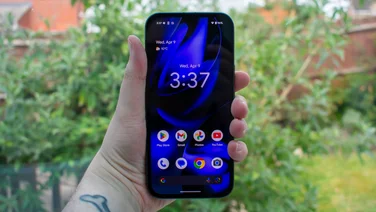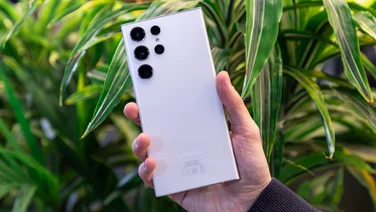To help us provide you with free impartial advice, we may earn a commission if you buy through links on our site. Learn more

Apple’s long awaited iPhone 8 is finally here. We’ve been waiting months for an official announcement, and now that all of the juicy details are out in the open, we can finally pit the iPhone 8 against its biggest Android competitor – the Samsung Galaxy S8.
If you’re on the fence about which of 2017’s best handsets you should buy, we’re here to help. In just a few short moments, all of your questions will be answered.
READ NEXT: Everything you need to know about the iPhone X
Here at Expert Reviews, we’ve done the leg work so you don’t have to, putting the Apple iPhone 8 against the Samsung Galaxy S8 in a fight to the death competition, so you know which one comes out on top. Below, you’ll find an in-depth analysis of every aspect of 2017’s top-tier flagships, from UK price, design, specifications and fancy features.
Now that the iPhone 8 has been released, you’re probably already reaching for your wallet. In that case, let’s get straight to it: here’s the definitive Apple iPhone vs Samsung Galaxy S8 guide. Let’s do this.
Buy the iPhone 8 for £32 a month and £160 upfront with O2
iPhone 8 vs Samsung Galaxy S8
iPhone 8 vs Samsung Galaxy S8: UK price
When it comes to price, it’s a very straightforward battle. This year’s iPhone 8 doesn’t deviate from Apple’s usual naming structure, sticking to a £699 asking price for the base model. If you’re after 256GB of storage as opposed to 64GB, expect to fork out £819.
Or if it’s a contract you’re after, O2 has a bargain tariff that works out at £928 over 24-months. For £32 monthly and £160 upfront, you’ll get 12GB of data, unlimited minutes and texts.

Currently, the Samsung Galaxy S8 retails for £689 but is available to buy for about £484 from Amazon. For comparison, Apple’s iPhone 7 retails at £528 for a base model. Samsung wins here.
iPhone 8 vs Samsung Galaxy S8: Hardware
The iPhone 8 improves on the iPhone 7’s performance. Underneath its glass and aluminium body lies Apple’s latest Soc chip, dubbed the A11 Fusion. We’re yet to properly put it through its paces ourselves, but Apple has quoted a decent 70% bump in multi-core performance over last year’s iPhone 7.
The Samsung Galaxy S8, however, isn’t so straightforward. It comes with either an Exynos 8895 or equipped with Qualcomm’s Snapdragon 835 processor. Last gen the Samsung Galaxy S8 overtook the iPhone 7 in terms of power, although not by too much, so it’s not too surprising to think that the A11 chip might usurp Samsung’s S8 when it arrives in September.
On the features front, the iPhone 8 doesn’t benefit from wireless charging like its iPhone X alternative, which is a real shame. The iPhone 8 comes in two storage options: 64GB and 256GB – with no room to expand via microSD.
Apple’s iPhone 8 will launch with iOS 11 as standard, and Samsung’s Galaxy S8 supports the latest version of Android Nougat but will be available to upgrade to Android 8 Oreo sometime later in the year.
iPhone 8 vs Samsung Galaxy S8: Camera
Apple’s iPhone 8 camera will, we can expect, make marginal gains on the performance of the iPhone 7. Its camera stats are the same: we’re again treated to a solitary 12-megapixel f/1.8 rear snapper, as opposed to the dual-camera setup on the iPhone 8 Plus and iPhone X.

Samsung’s Galaxy range of flagship phones did, at one point, come with some of the best cameras in the business. It’s been usurped by others since, but it’s still easily one of the best cameras you can find in a smartphone right now. The Galaxy S8 comes with a 12-megapixel Dual Pixel rear camera and an 8-megapixel front-facing camera, and both come with optical image stabilisation and autofocus. It even has a front-facing iris scanner to keep your phone secure and help take a great selfie.
iPhone 8 vs Samsung Galaxy S8: Design
The iPhone 8 doesn’t deviate too much from Apple’s handsets of old. Rather than the drastic design departure of the iPhone X, the iPhone 8 is pretty much bog-standard iPhone fare, there’s still the circular home button on the front, equipped with TouchID (which the iPhone X doesn’t have) as well as a 4.7in 1,334 x 750 resolution LCD display.
Samsung’s Galaxy S8, on the other hand, is a gorgeous sandwich of glass and metal, curved edges and sumptuous design. It’s curved-screen and curved display corners make it one of the most aesthetically pleasing and strikingly different smartphones on the market. The rear-mounted fingerprint sensor may be in an incredibly awkward position compared to other smartphones, but it does the job well.
Buy the iPhone 8 for £32 and £160 upfront with O2
In terms of pocket space, the Galaxy S8 comes in at 148.9 x 68.1 x 8mm and weighs 155g. Apple’s iPhone 8 on the other hand, measures 139 x 67.3 x 7.3mm, weighing in at 148g. Apple’s handset is smaller and lighter.
iPhone 8 vs Samsung Galaxy S8: Display
In terms of display, again the iPhone 8 is a little uninspiring. While the iPhone X gets the large 5.8in, 2,436 x 1,125 resolution OLED display, the iPhone 8 doesn’t get the same treatment, instead sticking with a 4.7in 1,334 x 750 resolution LCD panel, and a 5.5in Full HD LCD display on its plus-sized alternative. What it does benefit from this year, is TrueTone technology – the same found in Apple’s recent iPads.

The Galaxy S8 maintains Samsung’s reputation of producing brilliant phone displays. It features Samsung’s signature Super AMOLED panel but now stretched to 5.8in thanks to its unconventional 18:5.9 ratio. Because it’s a 2K AMOLED screen, Samsung packs in an impressive 570ppi pixel density too. It also has a perfect contrast ratio and comes with HDR support so the likes of Netflix and Amazon Video look absolutely brilliant.
iPhone 8 vs Samsung Galaxy S8: Verdict
As with all of these comparisons between two very different phones and ecosystems – it all comes down to preference.
Chances are the iPhone 8 and the Galaxy S8 will be quite similar in terms of power, potential and finish. In all honesty, the decision you’re making here isn’t “do I want a Samsung Galaxy S8 or an iPhone 8?” it’s, do I want to use iOS or Android? And that, my friends, is a different matter altogether.






